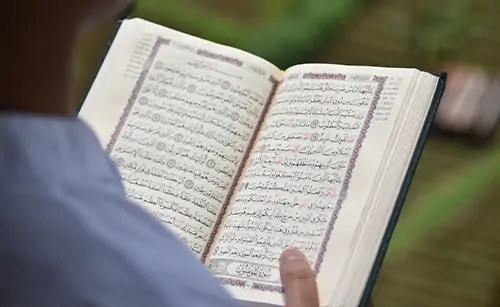Learn Tafseer of Surah Al-Fatiha: Meaning, Significance, and Tajweed Insights

Imagine standing in prayer, your hands folded, heart calm, and the first words you whisper are:
“Bismillahir-Rahmanir-Rahim” — In the Name of Allah, the Most Gracious, the Most Merciful.
Every Muslim, young or old, recites these words daily, yet few truly pause to understand the depth of Surah Al-Fatiha. It’s not just the opening of the Quran — it’s the key to the entire message of Islam, the foundation of faith, and the essence of our connection with Allah.
Through this blog, let’s embark on a reflective journey — exploring the Tafseer of Surah Al-Fatiha, uncovering its meanings, significance, and even learning how proper Tajweed enhances its beauty.
What Is Surah Al-Fatiha?
Surah Al-Fatiha (The Opening) is the first chapter of the Holy Quran, consisting of seven verses that are recited in every unit (rak‘ah) of Salah. Without it, no prayer is complete.
Revealed in Makkah, this Surah is both a supplication and a conversation between the servant and the Creator. It introduces believers to the central themes of Islam — Tawheed (oneness of Allah), Rahmah (mercy), and Hidayah (guidance).
According to scholars, it is called “Umm al-Kitab” — The Mother of the Book — because it contains the core message of the Quran in a concise form.
The Meaning and Tafseer of Surah Al-Fatiha
Let’s understand the verse-by-verse Tafseer to uncover its beauty and wisdom.
1. Bismillahir-Rahmanir-Rahim
In the Name of Allah, the Most Gracious, the Most Merciful.
This verse teaches Muslims to begin every act with Allah’s name, reminding us that all success and blessings flow from Him alone. Both Ar-Rahman and Ar-Raheem emphasize His infinite mercy — mercy that embraces all creation.
When recited with proper Tajweed, the softness of the letters reflects humility, while the rhythm soothes the heart.
2. Al-hamdu lillahi rabbil-‘alamin
All praise belongs to Allah, the Lord of all the worlds.
This verse affirms gratitude as a believer’s foundation. Every blessing — life, health, guidance — returns to Allah, the Lord who sustains every being.
Learning this verse in a Quran Tajweed course helps readers pronounce the word “al-‘ālamīn” with correct elongation (madd), reflecting the grandeur of Allah’s creation.

3. Ar-Rahmanir-Rahim
The Most Gracious, the Most Merciful.
The repetition of these attributes deepens understanding — Allah’s mercy is both general (for all creation) and specific (for believers). This verse nurtures hope, assuring that His mercy surpasses His wrath.
4. Maliki yawmi d-din
Master of the Day of Judgment.
This verse brings balance — after mercy comes accountability. Allah alone holds ultimate authority over our fate. Reciting “Māliki” with correct Tajweed emphasizes the long alif sound, symbolizing the eternal nature of Allah’s dominion.
5. Iyyaka na‘budu wa iyyaka nasta‘in
You alone we worship, and You alone we ask for help.
This verse defines the essence of servitude. It transitions the Surah from praise to devotion — a direct conversation between the believer and Allah. Notice the beauty: we worship and we ask for help — showing that Islam values collective unity in worship and reliance.
For learners, this verse is often practiced in Tajweed classes online, as it involves delicate articulation of ‘ayn (ع) and ḥa (ح).
6. Ihdina s-siratal-mustaqim
Guide us to the straight path.
This is the heart of every Muslim’s dua. It reflects humility — the realization that guidance is not a one-time event but a continuous need. Each recitation renews our plea for steadfastness.
7. Siratal-ladhina an‘amta ‘alayhim ghayril-maghdubi ‘alayhim wala d-dallin
The path of those You have blessed, not of those who earned Your anger or went astray.
This verse reminds us that true success lies in following the path of the prophets, the truthful, and the righteous. It warns against arrogance and misguidance.
Why Surah Al-Fatiha Is So Significant
Surah Al-Fatiha is not just a prayer — it’s a complete summary of Islam’s message:
- It teaches us who Allah is.
- It shows us how to worship Him.
- It reminds us of the Day of Judgment.
- And it guides us to the path of righteousness.
The Prophet ﷺ said,
“There is no prayer without the Opening Chapter (Al-Fatiha).”
(Sahih Muslim)
That’s why learning its Tafsir and Tajweed deepens not just understanding but also spirituality.
The Role of Tajweed in Surah Al-Fatiha
Tajweed means “to make better” — and applying Tajweed to Surah Al-Fatiha ensures every letter is pronounced as revealed. Small errors can alter meanings, especially in verses like “An‘amta” or “D-dallin.”
Through a Quran Tajweed course, learners master the rules of elongation (Madd), nasal sounds (Ghunna), and correct articulation points (Makharij). It’s not just pronunciation — it’s preserving revelation.
If you want to perfect your recitation, joining an online Tajweed course at Awwal Quran helps you gain confidence, connect deeply with Allah’s words, and earn the reward of reciting correctly.
Lessons from Tafseer of Surah Al-Fatiha
- Begin with Allah’s name in every act.
- Gratitude leads to faith — everything good comes from Allah.
- Mercy and justice go hand in hand.
- True worship combines love, fear, and hope.
- Guidance is a continuous journey, not a destination.
Conclusion
Surah Al-Fatiha is a divine dialogue between the Creator and His servant — a chapter that opens hearts and illuminates souls. Learning its Tafsir and Tajweed transforms how we recite, reflect, and live by the Quran.
Whether you’re a beginner or seeking deeper understanding, Awwal Quran’s online Tajweed and Quran courses are designed to help you recite beautifully and meaningfully — just as it was revealed.
FAQs
What does Surah Al-Fatiha teach us?
It teaches the essence of Islam — praise, worship, mercy, and seeking guidance from Allah alone.
Why is Surah Al-Fatiha called “The Opening”?
Because it opens both the Quran and the believer’s heart toward Allah’s message.
How many times do Muslims recite Surah Al-Fatiha daily?
It’s recited at least 17 times in daily Salah, making it the most repeated Surah.
Can I learn Surah Al-Fatiha with Tajweed online?
Yes, through an online Tajweed course at Awwal Quran, you can perfect your recitation with certified tutors.
Why is Tajweed important in reciting Surah Al-Fatiha?
Because correct pronunciation preserves meaning and honors the way it was revealed to Prophet Muhammad ﷺ.














